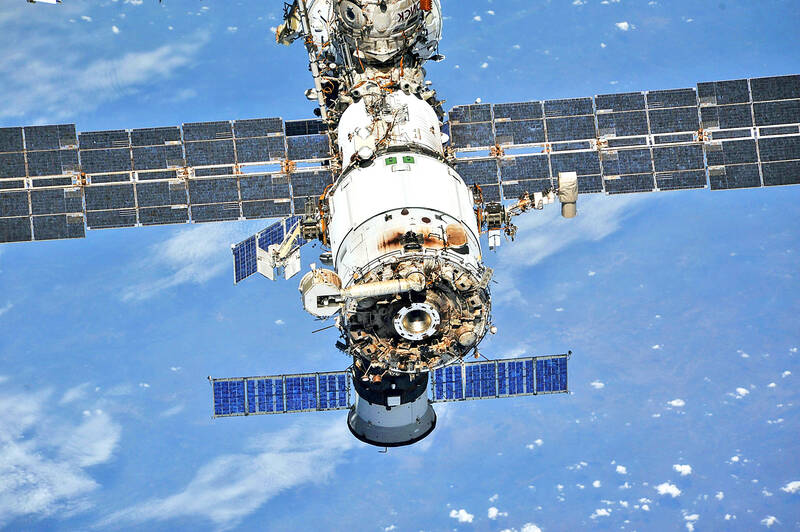Redwire Corp 3D-printed a meniscus on the International Space Station, the first time a human body part to be 3D-printed in space using human-derived tissues, the US aerospace company said on Thursday.
It serves as a vital proof-of-concept for the company as it pursues ways of leveraging the space environment to create human organs and tissues for transplantation.
Redwire is a front-runner in the effort to 3D-print human tissues in space, while the European Space Agency is also funding its own effort. Space has also been an attractive environment for creating protein crystals for use in pharmaceutical drugs, and start-ups such as Varda Space Industries Inc are hoping to leverage microgravity to better improve drug development.

Photo: NASA / Roscosmos / Reuters
Companies have pioneered 3D printing human organs and tissues on Earth for years, but when printing in the presence of gravity, bioengineers often must either add chemicals to their creations to keep the tissues firm or print the tissues onto matrices or scaffolding to provide structure.
It is easier for viscous materials such as tissue to hold their form in space, making them less complicated to construct without chemicals or scaffolding, Redwire said.
“When you turn off gravity, it creates an environment where you can successfully build tissues and organs,” Redwire chief growth officer Mike Gold said in an interview.
Redwire printed the meniscus — a critical cartilage found in the human knee — using human-derived stem cells and collagen in a specialized 3D bioprinter the company launched to the space station late last year aboard a Northrop Grumman Corp cargo capsule. The company then cultured the meniscus for 14 days in another Redwire facility launched to the space station last year.
The demonstration marks the first time a human body part was 3D-printed in space using human-derived tissues, Redwire said.
The printed meniscus returned to Earth on board a Space Exploration Technologies Corp (SpaceX) Crew Dragon capsule early on Monday. Since this was a demonstration, Redwire has no plans to transplant the meniscus into an actual knee.
“We’re going to study it, understand the process, and try to build from this to reproduce the success, and not only with the meniscus,” Gold said.
Gold declined to comment on the cost of printing the meniscus.
He said that the company’s plan is to figure out how to make organs like the meniscus in an affordable way and at greater scale.
Redwire chose the meniscus as tears of this tissue are one of the leading causes of orthopedic injury for people in the military.
Redwire recently announced a partnership with Sierra Space Corp to create drugs on a future commercial space station. Redwire would be launching more bioprinting payloads to the International Space Station in November on an upcoming SpaceX cargo mission, with plans to 3D-print cardiovascular tissue.

The US dollar was trading at NT$29.7 at 10am today on the Taipei Foreign Exchange, as the New Taiwan dollar gained NT$1.364 from the previous close last week. The NT dollar continued to rise today, after surging 3.07 percent on Friday. After opening at NT$30.91, the NT dollar gained more than NT$1 in just 15 minutes, briefly passing the NT$30 mark. Before the US Department of the Treasury's semi-annual currency report came out, expectations that the NT dollar would keep rising were already building. The NT dollar on Friday closed at NT$31.064, up by NT$0.953 — a 3.07 percent single-day gain. Today,

‘SHORT TERM’: The local currency would likely remain strong in the near term, driven by anticipated US trade pressure, capital inflows and expectations of a US Fed rate cut The US dollar is expected to fall below NT$30 in the near term, as traders anticipate increased pressure from Washington for Taiwan to allow the New Taiwan dollar to appreciate, Cathay United Bank (國泰世華銀行) chief economist Lin Chi-chao (林啟超) said. Following a sharp drop in the greenback against the NT dollar on Friday, Lin told the Central News Agency that the local currency is likely to remain strong in the short term, driven in part by market psychology surrounding anticipated US policy pressure. On Friday, the US dollar fell NT$0.953, or 3.07 percent, closing at NT$31.064 — its lowest level since Jan.

The New Taiwan dollar and Taiwanese stocks surged on signs that trade tensions between the world’s top two economies might start easing and as US tech earnings boosted the outlook of the nation’s semiconductor exports. The NT dollar strengthened as much as 3.8 percent versus the US dollar to 30.815, the biggest intraday gain since January 2011, closing at NT$31.064. The benchmark TAIEX jumped 2.73 percent to outperform the region’s equity gauges. Outlook for global trade improved after China said it is assessing possible trade talks with the US, providing a boost for the nation’s currency and shares. As the NT dollar

The Financial Supervisory Commission (FSC) yesterday met with some of the nation’s largest insurance companies as a skyrocketing New Taiwan dollar piles pressure on their hundreds of billions of dollars in US bond investments. The commission has asked some life insurance firms, among the biggest Asian holders of US debt, to discuss how the rapidly strengthening NT dollar has impacted their operations, people familiar with the matter said. The meeting took place as the NT dollar jumped as much as 5 percent yesterday, its biggest intraday gain in more than three decades. The local currency surged as exporters rushed to